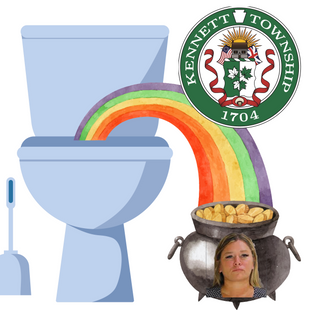With the posting of the proposed 2023 Kennett Township Budget, residents are beginning to react to Kennett Township's proposal to hike property taxes by 20% in 2023. Perhaps they believe that this hike will be all that is needed to relieve pressure felt equally from increased Police and Fire/EMS expenses, construction costs for the first sections of the Kennett Greenway, and inflationary pressures.
In fact, the tax hike is just the beginning of a story told through other posts linked below. Much more significant expenses will spiral rapidly upward over the next 5 years, fueled primarily by the 1.4 mile Chandler Mill Trail (CMT) section of the Greenway. While the 20% tax hike will pull an additional $820,000 from taxpayers in 2023 & 2024, Kennett proposes to drain 4 times that - more than $3.2 million - from operating revenue and reserves to cover the cost of CMT. Between CMT, Magnolia, and the 5 Point projects, Kennett proposes to drain capital reserves dry until 2031 and open space maintenance reserves dry until 2033. And Kennett's operating reserves could not be restored to 2022 levels until at least 2030.
What will we have after incurring this debt? The $8,000,000 in public funds ($7,000,000 for the 1.4 mile CMT and $1,000,000 for the quarter mile Magnolia Underpass) represent less than ⅛ of the entire Greenway (see figure below). The work to connect these two sections cannot begin before 2031 and would add $2-4,000,000 more. We have proposed piloting alternative designs for at least part of CMT that could significantly decrease costs AND make it more comfortable for all users, an alternative that supervisors and the Kennett Trail Alliance have consistently refused to consider.
-
And with all this money flowing in and out, and the potential for unexpected expenses and shortfalls, Townships should always have "cash in the bank", or an operating reserve.
- Townships rely heavily on taxes to pay for it all - about 80% in most years in Kennett. And as it turns out, the only way that township can really raise new money to cover increasing expenses is to increase local property taxes. But property taxes actually represent less than 1/3 of all of the taxes collected by Kennett (p. 7)
-
And all this is before major capital projects - like new roads, trails, sewer/water systems, township buildings, and so on - are taken into account. Townships must put some money each year into its infrastructure piggy bank - its capital reserve. Townships try to rely on grants to help out with major capital projects, but these cover no more than 70% of the cost, and only as long as these projects are not especially expensive. For example, grants will cover less than 50% of the 1.4 mile, $7+M Chandler Mill Trail.
-
Townships like Kennett are also supposed to maintain a separate sewer fund. This keeps funds for operating municipal sewer systems separate, so that those with private septic systems are not footing the bll for services they do not receive.
-
Of course, townships can always try to cut expenses, but the potential for significant savings diminishes rapidly.
So what are the red flags that townships are spending too much?
-
They can defer maintenance on essential infrastructure (like roads, sewers, and so on).
-
They can hold off funding their capital reserve.
-
They can raise taxes.
-
If they are really desperate, they can draw down on their operating reserve.
-
Any one of these steps could be a red flag that a township is spending more that it should. All of these red flags are waving right now around Kennett's budget.
-
In 2023, Kennett plans to do all that - and more - to balance their budget. they must defer maintenance of essential infrastructure until at least 2031, hike property taxes at least 20%, and drain their operating reserve below present levels until at least 2030. And even with all that, Kennett still has to borrow a million dollars from another fund - it's Open Space reserves- that will take almost a decade to repay, and require deferring related projects.
-
So why aren't these red flags drawing any attention? Because Kennett's inherently complex budget is conveyed through an inherently complex document. Finance Director Amy Heinrich does a truly admirable job laying out all of the numbers, but you have to know how to interpret these. We hope these posts will help!







